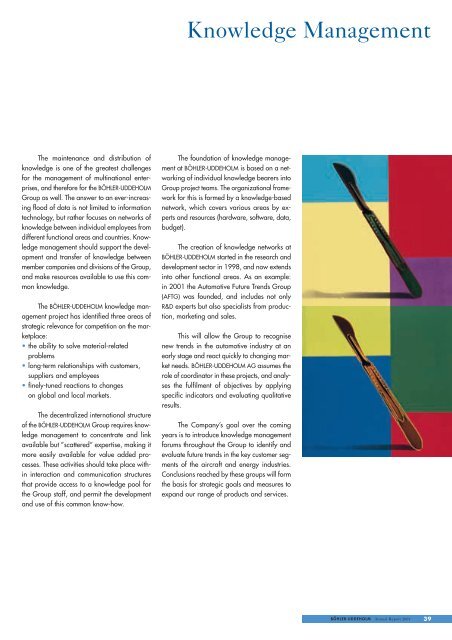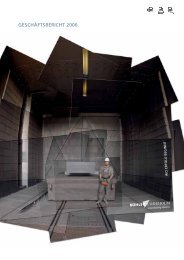Annual Report 2001 - Bohler Uddeholm materializing visions
Annual Report 2001 - Bohler Uddeholm materializing visions
Annual Report 2001 - Bohler Uddeholm materializing visions
Create successful ePaper yourself
Turn your PDF publications into a flip-book with our unique Google optimized e-Paper software.
The maintenance and distribution of<br />
knowledge is one of the greatest challenges<br />
for the management of multinational enterprises,<br />
and therefore for the BÖHLER-UDDEHOLM<br />
Group as well. The answer to an ever-increasing<br />
flood of data is not limited to information<br />
technology, but rather focuses on networks of<br />
knowledge between individual employees from<br />
different functional areas and countries. Knowledge<br />
management should support the development<br />
and transfer of knowledge between<br />
member companies and di<strong>visions</strong> of the Group,<br />
and make resources available to use this common<br />
knowledge.<br />
The BÖHLER-UDDEHOLM knowledge management<br />
project has identified three areas of<br />
strategic relevance for competition on the marketplace:<br />
• the ability to solve material-related<br />
problems<br />
• long-term relationships with customers,<br />
suppliers and employees<br />
• finely-tuned reactions to changes<br />
on global and local markets.<br />
The decentralized international structure<br />
of the BÖHLER-UDDEHOLM Group requires knowledge<br />
management to concentrate and link<br />
available but ”scattered“ expertise, making it<br />
more easily available for value added processes.<br />
These activities should take place within<br />
interaction and communication structures<br />
that provide access to a knowledge pool for<br />
the Group staff, and permit the development<br />
and use of this common know-how.<br />
Knowledge Management<br />
The foundation of knowledge management<br />
at BÖHLER-UDDEHOLM is based on a networking<br />
of individual knowledge bearers into<br />
Group project teams. The organizational framework<br />
for this is formed by a knowledge-based<br />
network, which covers various areas by experts<br />
and resources (hardware, software, data,<br />
budget).<br />
The creation of knowledge networks at<br />
BÖHLER-UDDEHOLM started in the research and<br />
development sector in 1998, and now extends<br />
into other functional areas. As an example:<br />
in <strong>2001</strong> the Automotive Future Trends Group<br />
(AFTG) was founded, and includes not only<br />
R&D experts but also specialists from production,<br />
marketing and sales.<br />
This will allow the Group to recognise<br />
new trends in the automotive industry at an<br />
early stage and react quickly to changing market<br />
needs. BÖHLER-UDDEHOLM AG assumes the<br />
role of coordinator in these projects, and analyses<br />
the fulfilment of objectives by applying<br />
specific indicators and evaluating qualitative<br />
results.<br />
The Company’s goal over the coming<br />
years is to introduce knowledge management<br />
forums throughout the Group to identify and<br />
evaluate future trends in the key customer segments<br />
of the aircraft and energy industries.<br />
Conclusions reached by these groups will form<br />
the basis for strategic goals and measures to<br />
expand our range of products and services.<br />
BÖHLER-UDDEHOLM <strong>Annual</strong> <strong>Report</strong> <strong>2001</strong> 39




